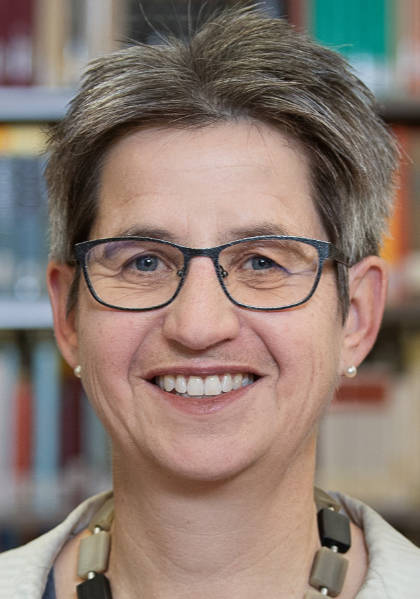“Schools reproduce inequality”

Katharina Maag Merki, Roland Reichenbach, what should schools be teaching children?
Roland Reichenbach: There’s a curriculum, but what you actually learn goes far beyond the lesson plan. School teaches you a sense of community. This is essential for a democratic society, as are civilized interactions with other people. These are achievements that are often not attributed to schools, even though they accomplish a great deal here. Modern society would have a real problem without schools – not necessarily because of what they teach, but because that’s where we learn what it means to be part of a society.
Schools teach basic cultural skills like reading, writing and arithmetic. Are they still doing this successfully?
Katharina Maag Merki: The scope has widened. Schools nowadays need to cover digital literacy and financial skills as well. Despite 11 years in school, 20% of students haven’t acquired elementary mathematical abilities, and 25% struggle with basic native language skills.
Reichenbach: The inadequate language skills are especially alarming. Someone who can’t express themselves, understand others or properly understand written documents will face a lot of barriers in life. When a large part of society cannot properly develop their potential, it affects us all. That’s why I believe we should consider reducing the amount of material covered for some students, focusing instead on strengthening basic skills.
Are overloaded lesson plans to blame? Many pupils handle the workload well and acquire valuable knowledge. For them, scaling back the curriculum would be counterproductive.
Maag Merki: I strongly agree that we should emphasize language skills. But what are the consequences of omitting other subjects? Wouldn’t that actually increase inequality? Wouldn’t this restrict students’ exposure to new, engaging topics?
Reichenbach: Setting universal achievement standards for all students presents us with a difficult choice: either we lower the standards, which of course no one wants, or we accept that some students won’t meet the requirements. In reality, schools cannot resolve this dilemma, even though they’re expected to pretend otherwise. The concept of inclusion, for instance, was well-intentioned. But in practice, it doesn’t work. This usually leads to calls for more resources, more human capital, more funding, while the underlying concepts remain unchallenged.

Contentment and life satisfaction extend beyond education and degrees.
Katharina Maag Merki, you criticize schools for sorting children by ability too early. Why is this a problem, in your view?
Maag Merki: Early academic sorting systematically places children of similar capabilities and drive into different achievement tracks, based on their family background. While certain students receive recommendations for upper secondary school, others are steered toward vocational paths. The same happens when deciding whether children should be placed in secondary school A or B. This means that capable and motivated students from families with less education find themselves blocked from advanced educational opportunities. In this way, schools end up perpetuating existing inequalities and, in some cases, making them worse. In this way, Switzerland’s system violates the principle of meritocracy more significantly than other countries.
Reichenbach: In Switzerland, this type of inequality isn’t as dramatic because the gap in career paths isn’t as large. Most young people pursue vocational training, which leads to high skill levels throughout our workforce. Our economy actually benefits from having a lower rate of upper secondary school graduates than other countries. So we can’t claim that inequality in Swiss education creates economic problems. The real question is why people are content with their situation. Whether or not you attend upper secondary school seems to not be that important for a segment of the population. Contentment and life satisfaction extend beyond formal education and degrees. Additionally, our youth unemployment figures are better than in many other countries.
Maag Merki: We have a system where only a small portion of young people actually fall through the cracks. At the same time, social mobility in Switzerland is relatively low – climbing from one social class to the next takes five generations. By comparison, Danes can accomplish this in only two generations.

Selection should only take place at the end of secondary school. If selection takes place later, the various educational pathways will be open to everyone for longer.
Katharina Maag Merki, you see early tracking as part of a system that puts kids from less educated families at a disadvantage. Would delaying the academic selection process lead to greater fairness?
Maag Merki: Delaying this selection would be a key part of addressing the issue. Countries like Canada or Finland, which have less social inequality, use all nine years of regular schooling to nurture each child’s individual development. We need structural reform. Selection should be delayed until students complete secondary school. Delaying selection keeps educational options open longer for all students. This is crucial since students often perform at different levels across various subjects. A quarter of students in the lowest secondary track outperform the weakest upper secondary students in some subjects, for example. There’s an enormous gap between the opportunities open to those with a Swiss university entrance qualification compared to those with a Secondary C diploma, even though these students might have similar abilities.
Roland Reichenbach, do you agree with this analysis?
Reichenbach: Yes, academic sorting is done too early.
Another pressing issue for you is the matter of grades. Why is that?
Maag Merki: I think providing feedback is far more valuable than assigning grades, as students who get detailed responses about their work are more successful in reaching their learning goals. Moreover, grades can discourage and frustrate students. Constantly receiving low grades kills the desire to learn. This is another reason why some students end up not reaching their goals.
Reichenbach: Grades are part of the school’s selection system. Some form of selection and sorting has to take place. This creates disparities in future opportunities. There’s a need to legitimize why access to higher education shouldn’t be equally open to everyone after they complete compulsory schooling. The selection system is also problematic because we know the opportunities aren’t equal, and they never will be. In other words, fair selection is essentially impossible, whether we give grades or not. But is there a better alternative? My view is that we haven’t found one yet.
Does teaching need to become more tailored to individual students?
Reichenbach: This is a point on which we disagree. We need to compare student performance, but it’s not possible if everything is individualized. This is an unresolvable dilemma, and it reflects a privileged educational viewpoint. When trying to address each child’s individual needs, you need to remember that stronger students are always engaged and focused on achievement while weaker students often find it hard to stay motivated. More personalized teaching won’t alter this basic dynamic.
Maag Merki: I don’t see individualized learning as everyone working by themselves all the time. My formula is that a third of the time is spent learning as a group, with students exploring specific content together in class, one third is spend working in small groups where students develop something together and learn from each other, and another third is spent working independently on a topic that the child is interested in. Here the weaker students would need special support. Students should be able to spend part of their learning time on things that intrinsically interest them.
Roland Reichenbach, you believe that teachers have lost some of their authority, yet this authority is vital for effective class management and instruction. Is this why you’re calling for a “new” form of authority?
Reichenbach: I’m not advocating for authority at all, whether new or traditional. Although the term “authority” has negative connotations, it’s indispensable for both education and child-rearing. As I understand it, authority means that someone stands in front of others and says something, and what they say is believed. It’s a relationship based on acknowledgment. Authority of this kind can be very limited in scope. A piano teacher can’t tell me whether I should smoke or not, but they can show me how to play the piano. When a teacher doesn’t receive this trust and recognition, they can’t do their job effectively. Teachers often react to this by acting authoritarian, a strategy that generally doesn’t work.
Katharina Maag Merki, do you think there needs to be a new kind of authority
in the classroom?
Maag Merki: In my view it’s essential to distinguish between being authoritarian and being authoritative – which means setting supportive boundaries, fostering trust and creating meaningful connections. That’s very important.
We’ve talked about what is needed to have good schools. Could you briefly describe what an ideal school would look like?
Reichenbach: What I’m about to say might sound completely old fashioned, but I believe all pupils can be happy if they have a teacher who loves their profession, who wants kids to learn and supports them in doing so. That’s really all you can ask for.
Maag Merki: I agree that teachers play an essential role, but I think that the entire school has to be involved. That means that teachers aren’t left on their own but rather are integrated into what is hopefully a properly functioning institution. For me, the perfect school is one where everyone shares knowledge, works together and achieves goals together with the students.